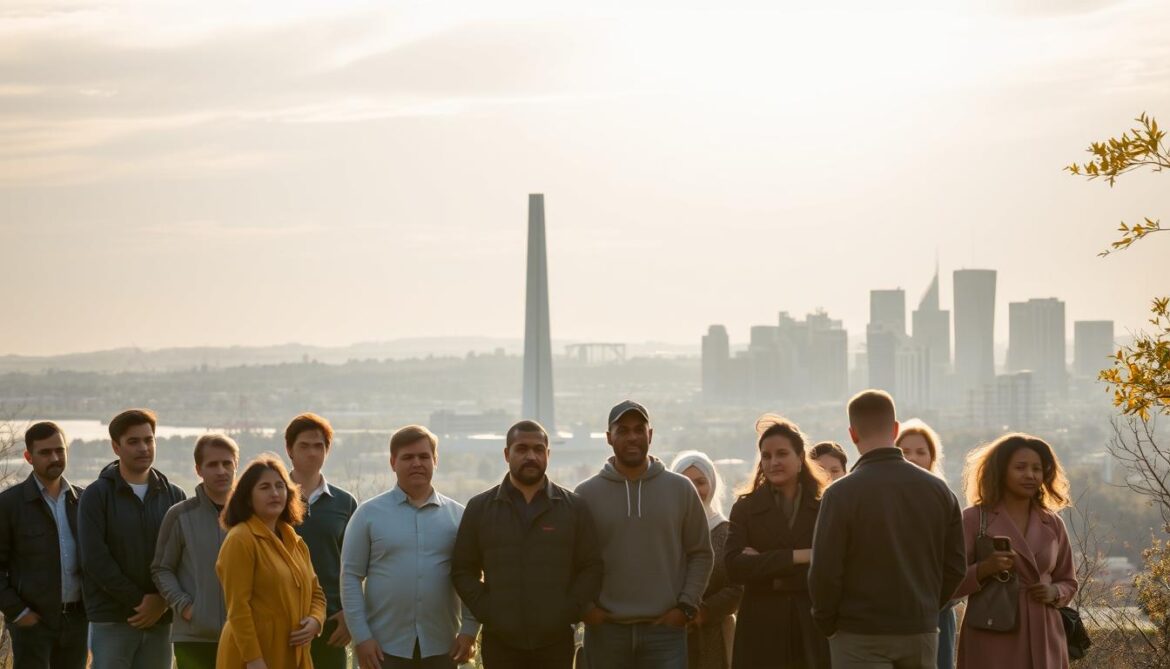Hate crime reports in Canada jumped 72% from 2020 to 2021. This shows we need to act now to stop genocide advocacy. In our world today, spreading such harmful ideas is a big risk. It requires everyone to be aware and take action.
Understanding how to prevent genocide advocacy is key to fight these threats. Hate crimes often target religious minorities (37%) and people with disabilities (22%). Education and collective action are vital. Thanks to focused education and legal changes, reported hate incidents increased by 47% from 2019 to 2022 in Canada.
Taking part in prevention efforts makes our society safer and more welcoming. These tips not only boost awareness and empathy but also help stop hateful speech. Learning about and teaching others human rights builds a fairer future. Help prevent genocide advocacy today and create real change.
Understanding the Root Causes of Genocide
Genocide means the targeted killing of people from a specific group. This horror comes from deep issues within society. To stop it, we must understand why it happens.
Definition and Key Concepts
Genocide happens when there is a plan to destroy a certain group. Conflicts about people’s identities often lead to such terrible acts. It’s not our differences, but the unfairness linked to them that causes trouble.
Seeing and fixing these unfair situations is key. This is how we learn how to stop advocating genocide.
Historical Examples and Lessons
Rwanda and Bosnia show us sad lessons. In these places, genocide was fuelled by rights abuses and discrimination. The social and economic situations there made matters worse.
These cases show how important it is to work on prevention. By doing this, we can lower the chance of such events happening again.
Recognizing Early Warning Signs
It’s vital to notice signs that could lead to genocide. Issues like tense relations between groups, weak government structures, and illegal weapons increase the danger. Acting early can prevent tragedies.
Good leadership and fair treatment of all people can help. Making sure everyone is treated as an equal part of the community is crucial. This proactive approach is key to stopping the support for genocide worldwide.
Genocide Prevention Strategies: International Mechanisms
Stopping genocide needs strong international systems. These include treaties, strict law enforcement, and working together globally. Knowing these parts shows how they fight genocide.
Role of International Treaties
International treaties are key in stopping genocide. They are agreements between countries to prevent and punish genocide acts. Genocide prevention through international treaties makes countries work together against such crimes.
Impact of the Genocide Convention
The Genocide Convention was a big step in 1948 by the United Nations. It makes countries promise to stop and punish genocide. This shows the world agrees on fighting hard against genocide.
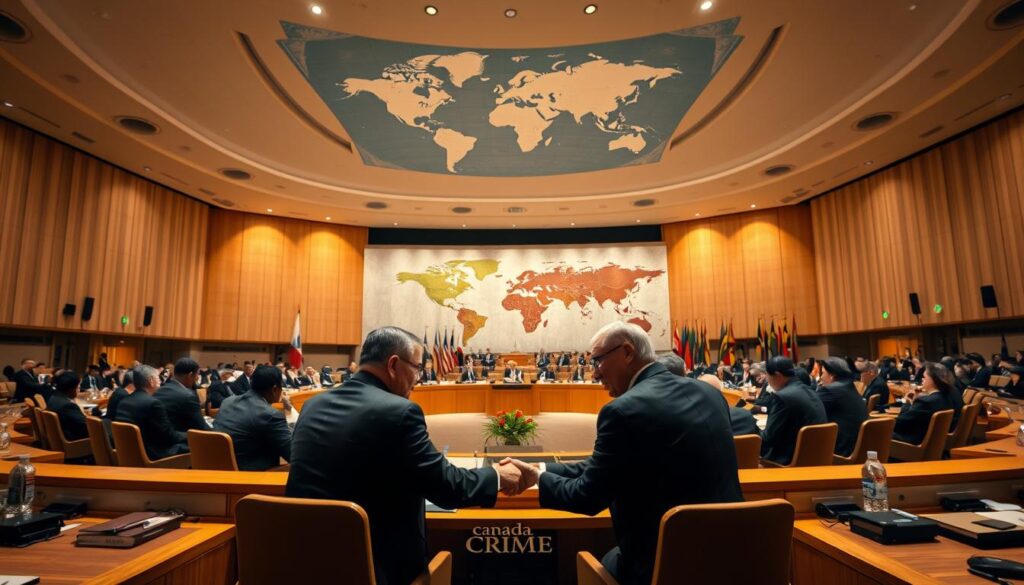
Importance of the International Criminal Court (ICC)
The ICC plays a big part in going after those who cause genocide. It works as a court that can judge such cases globally. The ICC helps scare off future crimes and gives justice to victims.
The ICC follows the Rome Statute, letting it judge on genocide and other serious crimes. Making sure the ICC works well is vital in stopping genocide worldwide. It’s key in the battle against letting crimes go unpunished.
Creative Actions and Approaches to Stop Genocide
Combating genocide needs creative strategies and solid efforts. It’s not just about what the government does. Grassroots movements and educational work also play a big part. Focusing on community efforts in genocide prevention lets people and groups make a big difference. They help stop terrible acts from growing worse.
Mobilizing Community Efforts
Getting involved at the community level is key. Local groups can bring people and resources together to raise awareness. They support those who might be in danger. They also set up networks to spot and report signs of coming violence. Programs like community policing, neighborhood watches, and civic education can make communities stronger against these threats. These community efforts in genocide prevention help people take action early.
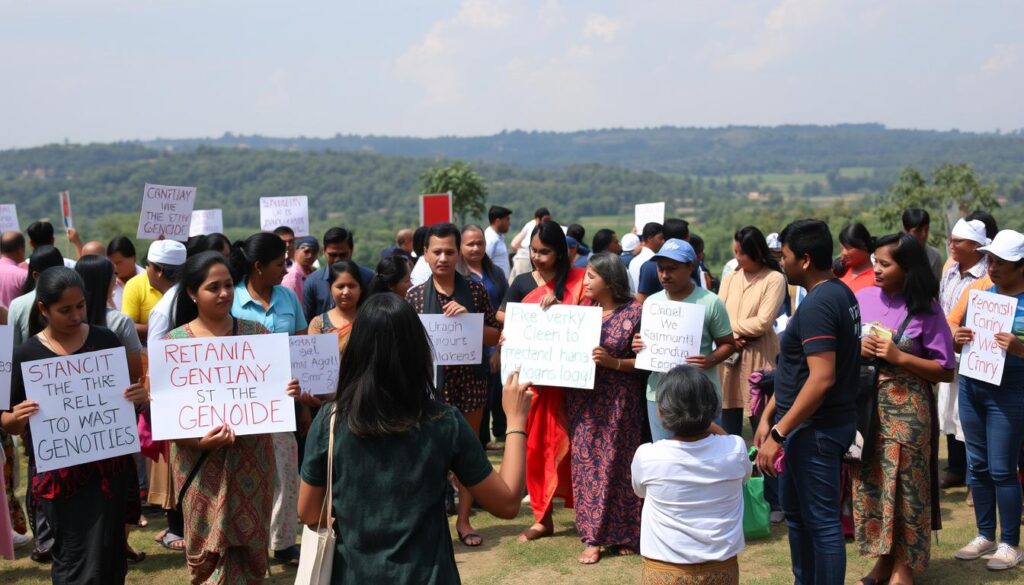
Engaging in Dialogue and Education
Education to prevent genocide is a strong tool. Schools and local educational places should teach about genocide prevention. They should tell students about what has happened before and why being tolerant is crucial. Bringing different groups together to talk can ease tensions between ethnic and cultural lines. This builds a peace-loving, respectful culture. Teaching the young ones creates citizens who stand against division.
Leveraging Artistic and Cultural Interventions
Arts and culture can send important messages and build understanding. Things like music, plays, art, and books can make people more aware of genocide. They touch hearts, change minds, and bring people together. Events like art shows, movie nights, and festivals celebrating peace can strengthen how people get along. This helps a lot with the education to prevent genocide.
Tips to Prevent Advocating Genocide
Preventing advocacy of genocide needs many efforts. We should focus on increasing sensitivity, fighting harmful speech, and teaching about human rights. Here are useful tips on doing just that.
Promoting Awareness and Sensitivity
Raising awareness about genocide is key. Education helps people learn about its terrible effects and the signs that it might be coming. By getting leaders, teachers, and activists involved, these efforts reach many and create empathy across different groups.
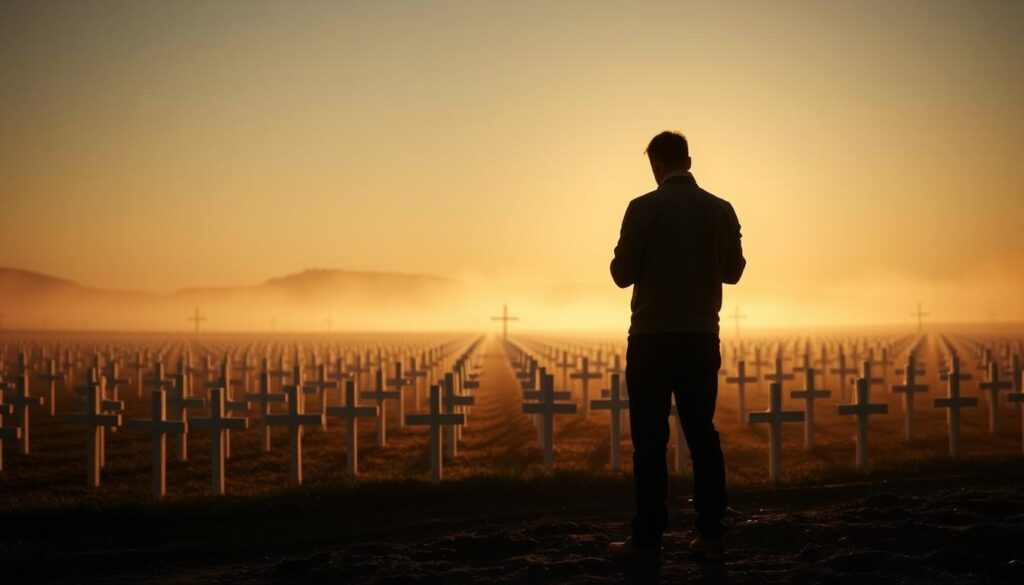
Spotting and Countering Dangerous Rhetoric
It’s important to notice and act against harmful speech. This includes language that makes people seem less human, hate speech, and false beliefs that lead to violence. By promoting open talks, keeping an eye on what’s said in public, and acting against negative stories, we can make a difference. Learning how to think critically and spot biased information is also crucial.
Incorporating Human Rights Education
Teaching human rights from a young age is a powerful way to stop genocide. It teaches kids about fairness, justice, and respecting everyone’s rights. Educational places should add these lessons to their programs. This way, we prepare a generation that respects others and opposes crimes against humanity. Public campaigns and workshops also help spread these important messages to more people.
| Tip | Details |
|---|---|
| Promoting Awareness and Sensitivity | Educational campaigns involving community leaders and activists to enhance understanding and empathy. |
| Spotting and Countering Dangerous Rhetoric | Identifying hate speech and myths, fostering media literacy, and encouraging open dialogues to counter harmful narratives. |
| Incorporating Human Rights Education | Embedding principles of equality and justice in educational systems and public awareness initiatives. |
Measures to Prevent Advocating Genocide in Canada
Canada has taken strong steps against the advocacy of genocide. It focuses on stopping domestic hate speech and building a solid legal base. This shows Canada’s determination to fight these horrible acts and make their country more peaceful and safe.
Addressing Domestic Hate Speech
Canada fights genocide with tough policies on hate speech. Laws like the Canadian Human Rights Act and the Criminal Code make promoting genocide illegal. These laws protect human rights and stop violence and unfair treatment from spreading. Education campaigns also help people from different backgrounds get along and stop extreme beliefs from growing.
Legal Framework and Crime Code
The Canadian legal framework on hate speech includes detailed parts of the Criminal Code. It has sections that stop people from supporting genocide, making sure they face justice. Canada’s commitment to these laws shows its strong stance on human rights. It also warns those who might spread violence or hate.
| Legal Provision | Description |
|---|---|
| Criminal Code Section 318 | Prohibits advocating or promoting genocide |
| Canadian Human Rights Act Section 13 | Prohibits hate speech over telecommunications |
| Criminal Code Section 319 | Prohibits public incitement of hatred |
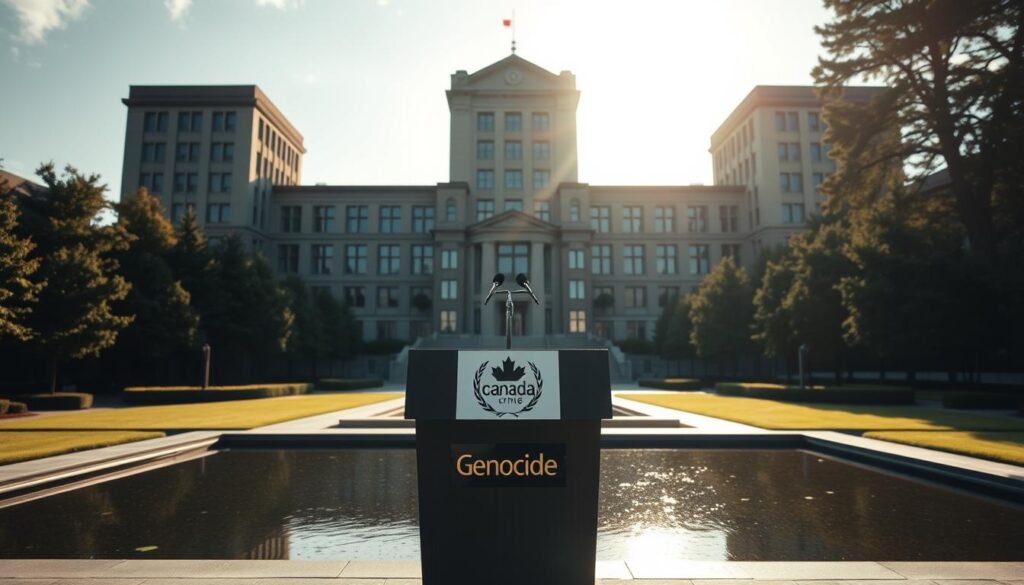
Collaborating with Law Enforcement
Working together, community groups and police enforce Canada’s measures against genocide. This teamwork offers quick reactions to threats and better sharing of information. Police receive training to spot and deal with hate crimes. This creates a safe space where people are protected and hate speech is quickly stopped.
Role of Education in Genocide Prevention
The power of education is clear in preventing genocide through education. Education helps people understand the dangers of genocide and grow a culture of tolerance. Adding educational strategies against genocide to curricula is key to create a world where everyone feels included and peace prevails.
Good educational strategies against genocide teach about past genocides and human rights. Teachers should focus on empathy, ethical responsibility, and the problems with hate speech and discrimination. Schools and colleges should work with groups like the United Nations Educational, Scientific and Cultural Organization (UNESCO) and the Holocaust Memorial Museum. They offer important and impactful learning.
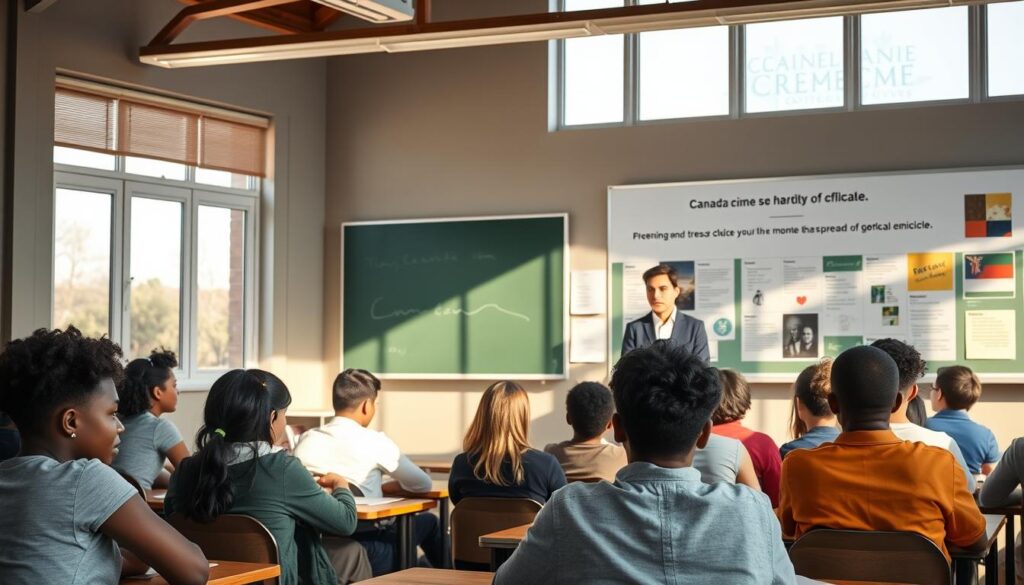
Using technology can also improve how students learn about genocide. Tools like interactive online platforms and virtual reality can make learning more interesting. These resources help students understand how serious genocide is and why we must always be alert against it.
Here is a look at how old and new methods compare:
| Traditional Educational Methods | Modern, Tech-based Methods |
|---|---|
| Textbooks and lectures | Interactive online platforms |
| Classroom discussions | Virtual reality experiences |
| Historical documentaries | Multimedia resources |
To stop genocide with education, we need both old and new ways of teaching. By using these methods, we build a world that’s more knowledgeable, kind, and strong.
The Importance of Early Warning Systems
Early warning systems play a key role in stopping genocides before they begin. They help spot early signs of mass killings, giving a chance to step in and save lives. The Rwanda and Bosnia genocides show why we must watch closely and report quickly.
Monitoring and Reporting Mechanisms
Good early warning systems need reliable ways to monitor and report. They use various tools and methods to notice signs of potential genocides. Things like political turmoil, hate speech, and abuses of human rights are vital to watch for. Adding technology such as satellite images and social media helps gather data quickly and accurately.

NGOs and international groups are crucial in reporting to organizations like the United Nations. This can lead to global awareness and action. Countries working together make these systems more effective, leading to a joined effort in catching early warning signs.
Case Studies: Rwanda and Bosnia
Looking at the genocides in Rwanda and Bosnia helps us understand early warning systems better. In Rwanda, not acting quickly on clear warnings led to a horrific genocide. This shows the urgent need for strict monitoring.
“Despite numerous warnings, the international community failed to intervene in time to prevent the 1994 genocide in Rwanda, resulting in over 800,000 deaths.” – Samantha Power, former U.S. Ambassador to the UN.
On the other hand, Bosnia shows some success with early warnings leading to action. However, the efforts were not enough to stop all the violence. These examples stress quick and united actions based on early warnings to prevent violence from growing into genocides.
| Case | Early Warning | Intervention | Outcome |
|---|---|---|---|
| Rwanda | Clear signs reported | Delayed and inadequate | 800,000+ deaths |
| Bosnia | Moderate signs reported | Partial intervention | Thousands displaced and killed |
Mobilizing Global Efforts to Combat Genocide
Fighting genocide needs strong international teamwork. Countries and global groups must unite to spot early signs, tackle root problems, and take effective action.
International Collaboration and Coordination
Working together is crucial to stop and deal with genocide. The world’s fight against it depends on countries, NGOs, and international groups getting along. Documents like the Genocide Convention show how important it is for everyone to work together.
To make these efforts stronger, sharing resources, information, and diplomatic help is key. This way, countries can have a united strategy, making sure they are ready to act quickly and efficiently.
Case Studies: United Nations’ Interventions
The United Nations (UN) has been central in trying to prevent genocide. UN interventions in genocide prevention cover different areas and crises, showing us the challenges in stopping these horrors.
In Rwanda, the UN’s efforts were not enough, leading to worldwide disapproval. Still, this failure taught important lessons for facing future crises. In Bosnia, the UN had mixed results. They helped with peace deals and aid, but not without facing big hurdles.
These examples underline how important the UN and global teamwork are in fighting genocide. We need to stay ready and work together to confront these terrible acts quickly and powerfully.
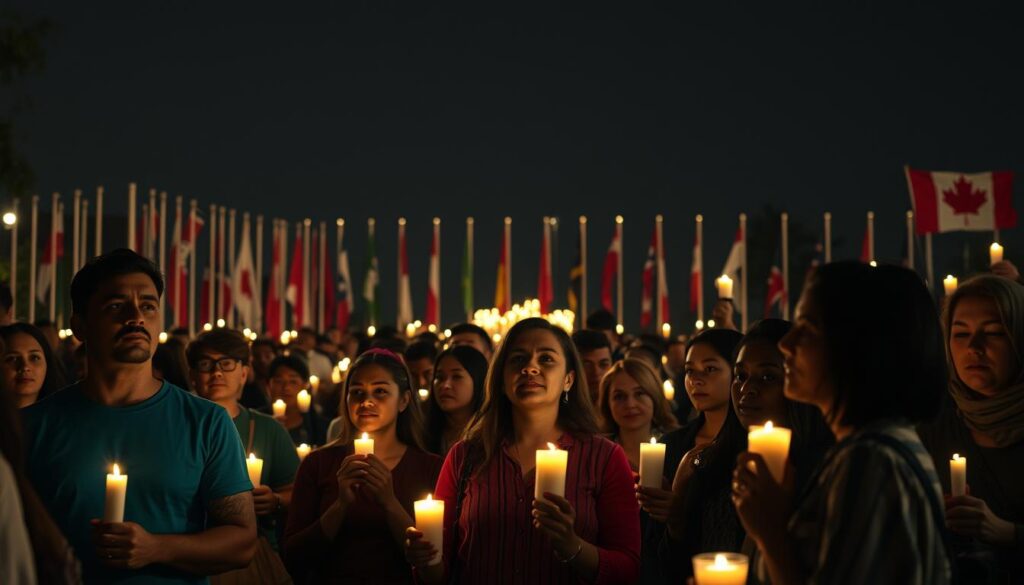
Conclusion
In the fight against genocide advocacy, everyone from local groups to worldwide organizations has a role. Knowing about past genocides, like the Holocaust and Rwandan massacre, helps us learn from history. It’s also key to recognize the early signs of threat.
Stopping genocide before it starts means using global tools, like the Genocide Convention and the International Criminal Court (ICC). The ICC plays a big role by making sure people who cause harm face consequences. Learning about these tools, and working together as a community are important steps.
To prevent genocide, we need constant education and systems that alert us to dangers quickly. Working together globally, as the United Nations does, is crucial. For more on stopping genocide, check out this detailed guide. Always being watchful and ready to take action helps fight against the horror of genocide. By staying aware and involved, we remind ourselves of the urgent need to prevent such crimes together.

